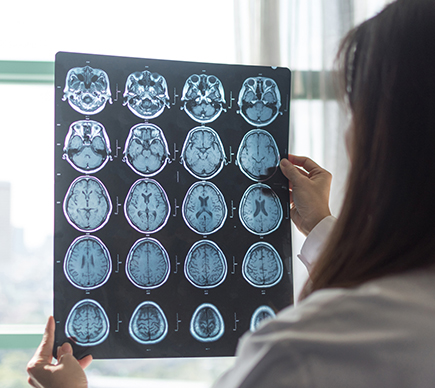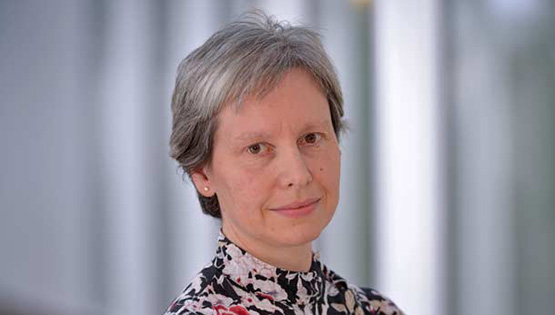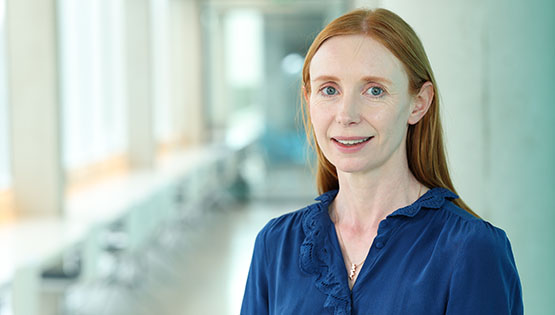Micro-credential
4 months
Hybrid - Part-time
10 ECTS
September 2025
About
Develop your knowledge and understanding of contemporary clinical neuroscience with the micro-credential in (Clinical) Neuroscience from RCSI School of Physiotherapy.
The field of clinical neuroscience has expanded rapidly and opened new frontiers in our understanding of the nervous system – in particular, how it develops, ages and recovers from injury.
Discover how to apply this knowledge to your work with people with neurological conditions through clinical reasoning and a case-based approach. This course focuses primarily on neuroscience related to motor function and behaviour, and the interplay with cognitive and sensory functions.
The course is delivered part-time in a hybrid model with online material for participants to access in their own time and prior to workshops/classes.
This self-directed learning is followed by scheduled in-person workshops and classes on RCSI's St Stephen's Green campus.
Expand your understanding of contemporary clinical neuroscience
Explore motor function and behaviour and the interplay with cognitive and sensory functions
Learn to apply knowledge with a case-based approach
Suitable for
This course is for healthcare professionals working in clinical neurology and/or neurological rehabilitation in hospital, community or private practice settings. Professionals such as physiotherapists, occupational therapists and nurses may apply for this course.
What you will learn
Faculty highlight
Register your interest
Course information
On successful completion of this module, the student will be able to:
- Demonstrate advanced understanding of the structure and function of the nervous system motor and sensory functions.
- Demonstrate critical understanding of current concepts of neuroplasticity, motor control and motor learning; and apply this knowledge to clinical practice.
- Demonstrate critical understanding of pain neuroscience, and apply this knowledge to the assessment and management of pain for people with neurological conditions.
- Explain the pathophysiology of disorders of tone; evaluate the impact of hypertonia on the control of sensorimotor function, activity and participation in people with neurological conditions; and apply this understanding to practice.
- Analyse and explain the neuroscience and biomechanics of normal gait and balance, and critically evaluate gait and balance dysfunction in people with neurological conditions.
- Explain the neuroscientific basis of cognitive and perceptual disorders following central nervous system injury, and demonstrate understanding of how they affect function.
The course runs from September to December.
There are four in-person half days for students to attend.
Students who successfully complete this module and pass the assessment will receive a certificate detailing the academic award and credits received. This is a postgraduate programme and those who complete this course will gain 10 European Credit Transfer System (ECTS) at Level 9 on the National Framework of Qualifications (equivalent to Level 7 on the European Framework of Qualifications).
RCSI's micro-credentials may be stacked to build to a higher award.
We are proud to be a recognised University of the National University of Ireland (NUI).
Recognition by ministries and bodies in other jurisdictions must be determined by the individual applicants.
Admissions
To be considered for entry into the programme, applicants must:
- Be a healthcare professional.
- Hold a bachelor degree. If you don’t hold a bachelor degree, please see the recognition of prior learning pathway.
- Experience working with people with neurological conditions is desirable, but not essential.
- If English is not your first language, you will also need to supply a copy of an academic IELTS examination or equivalent, with an overall score of at least 6.5 and no individual band below 6.5.
Each application will be assessed on an individual basis.
If you do not have an undergraduate degree at Level 7 or above you may still be eligible to apply through recognition of prior learning (RPL). RPL is the assessment of knowledge, skills and competence previously acquired.
Learning occurs in many contexts which include work, involvement in social and community activities, or learning through life experience generally. RPL does not give credit for experience as such; rather it considers the learning that was acquired as a result of the experience.
RPL may be used to gain:
- Admission to courses/programmes where a person may not have obtained the standard entry requirements.
- Exemptions from course modules which duplicate the learning outcomes an individual has already demonstrably acquired through prior learning.
- Fees: €1,350 (to be paid on acceptance of the course).
- ECTS credits: 10.
How to apply
Applications for the September 2025 intake are now open.
Secure your place for the programme by completing the form below.
Please ensure you attach the following supporting documents with your application:
- Clear copy of a valid passport.
- Copies of your academic transcripts/degree.
- Copy of CV.
- English proficiency test (if required).
Already begun your application? Complete it via our application portal now.
Continue your application



